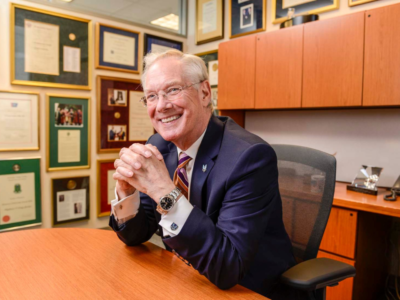Huiping Liu, associate professor of pharmacology and medicine at Northwestern University Feinberg School of Medicine and Robert H. Lurie Comprehensive Cancer Center, appeared on the Cancer Luminaries podcast. This series was launched by the UChicago Medicine Comprehensive Cancer Center to mark its 50th year as an NCI-designated center.
Suzanne Conzen, chief of the Hematology and Oncology Division at UT Southwestern Harold C. Simmons Comprehensive Cancer Center, appeared on the Cancer Luminaries podcast, a series launched by the UChicago Medicine Comprehensive Cancer Center to mark its 50th year as a National Cancer Institute-designated center.
Tobacco companies have capitalized on the Olympics’ widespread cultural impact since the birth of the modern Olympic Games in 1896—until the practice was stopped in 1987.
Two decades after uncovering the role of EGFR mutations in lung cancer, scientists are still grappling with lingering research questions.
In 1998, lung cancer was the leading cause of cancer deaths in the United States, with 160,000 deaths per year. That statistic inspired Matthew Meyerson, who would soon start working at the Dana-Farber Cancer Institute, to specialize in lung cancer.
Edward Sondik, former director of the National Center for Health Statistics at CDC, who previously served as an acting director of NCI, and a deputy director of the NCI Division of Cancer Prevention and Control, died on June 25. He was 82.
On Sept. 24, 2002, the Oncologic Drugs Advisory Committee recommended an accelerated approval for AstraZeneca’s Iressa (gefitinib). The recommendation concluded a meeting where ODAC weighed whether the drug, an EGFR tyrosine kinase inhibitor, could benefit patients with resistant or refractory non-small cell lung cancer as a third-line therapy.
V. Craig Jordan, a pharmacologist who discovered selective estrogen receptor modulators, died on June 9. Jordan, a professor at The University of Texas MD Anderson Cancer Center who was credited with discovery of tamoxifen, was 76. An obituary appears in this issue. Jordan appeared on the Cancer History Project podcast in 2022 to discuss […]
Don Dizon, director of the Pelvic Malignancies Program at Lifespan Cancer Institute, head of community outreach and engagement at Legorreta Cancer Center, and director of medical oncology at Rhode Island Hospital, spoke with NFN Scout, executive director of the National LGBT Cancer Network, on Your Stories: Conquering Cancer podcast. In this episode, published June 25, […]
As over 40,000 oncology professionals descend on Chicago’s McCormick Place yet again for the 60th American Society of Clinical Oncology annual meeting, we invite you to look back at The Cancer Letter and the Cancer History Project’s past coverage of the event.















